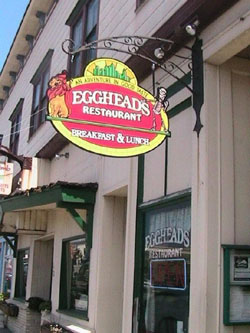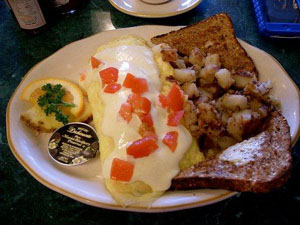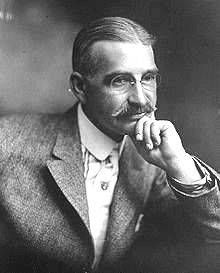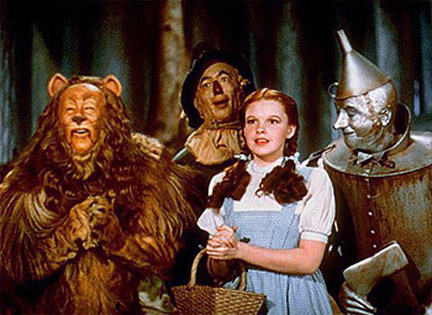
EGGHEAD'S RESTAURANT
Like a delicious sliver of pie, the Egghead's Restaurant is sandwiched between two main street buildings in downtown Fort Bragg. Cozy to say the least and furnished with corner tables and spacious booths (seating for 36) the aromas of prepared from scratch omelettes, benedicts, many unique specialties, fresh brewed coffee and espresso spills out into the dining room. The fun loving owners have developed the Wizard of Oz theme over the years. They wanted to offer Fort Bragg residents and tourists an up-tempo dining experience at a moderate price. Everybody wins at Egghead's Restaurant where the decor is a reminder of the finest movie musical of our time; The Wizard of OZ.

Prices are reasonable and servings are generous at this popular eatery. Breakfast offers over 50 selections - about half being vegetarian or heart healthy choices. Egghead's uses only top of the line meats and the freshest fruits and vegies - organic whenever possible. They feature prepared from scratch pancakes, egg dishes, homemade salsa and hollandaise as well as fresh squeezed juice. The unique lunch menu includes fresh salads, unusual sandwiches and 1/2 lb burgers. For the most discerning taste buds, Egghead's Restaurant is located only 1 block away from the Skunk Train Depot. Special requests are honored and all orders can be prepared to go. "A trip to Oz is an adventure in good taste," states the Wizard!
$-$$ EGGHEAD OMELETTES of OZ
Country Breakfast and Lunch - Established in 1976.
326 N. Main Street, Fort Bragg, CA. 95437
Open 7 days a week (7am to 2pm)
"Toto" to go orders (707) 964-5005
The WONDERFUL WIZARD OF OZ Was Originally A CHILDREN'S BOOK
Movie Trailers from the 1939 movie are at the bottom of this story.
The Wonderful Wizard of Oz is a children's novel written by L. Frank Baum and illustrated by W.W. Denslow. It was originally published by the George M. Hill Company in Chicago on May 17, 1900, and has since been reprinted countless times, most often under the name The Wizard of Oz, which is the name of both the 1902 stage play and the extremely popular, highly acclaimed 1939 film version.  It is always fun to visit used book stores with your children to see if there are any historic books about the Wonderful Wizard of Oz collecting dust on the shelves. Such books could be very valuable in todays market.
It is always fun to visit used book stores with your children to see if there are any historic books about the Wonderful Wizard of Oz collecting dust on the shelves. Such books could be very valuable in todays market.
Political imagery in The Wizard of Oz
Like many writers, Baum wrote with polical imagery about the "Yellow Brick Road". Where did it lead to and in the end where is the best place to end up? Although numerous political references to the "Wizard" appeared early in the 20th century, it was in a scholarly article by Henry Littlefield, an upstate New York high school history teacher, published in 1964 that there appeared the first full-fledged interpretation of the novel as an extended political allegory of the politics and characters of the 1890s. Special attention was paid to the Populist metaphors and debates over silver and gold.
THE HIDDEN ALLEGORY IN THE WIZARD OF OZ
Baum viewed events in the 1890's political climate from up-close in both rural South Dakota and urban Chicago. He mourned the destruction of the fragile alliance between the Midwestern farmers (The Scarecrow) and the urban industrial workers (the Tin-man). Along with Bryan (the Cowardly Lion with aloud roar but little bit), they had been taken down the yellow brick road (the gold standard) that leads nowhere. Each journeyed to the Emerald (the Capitol) seeking favors from the Wizard of Oz (the President). Even the name Oz is an abbreviation of the standard measurement of gold, the ounce. Dorothy, the symbol of Everyman, went along with them, in her silver shoes (changed to ruby in the 1939 movie). She was innocent enough to see the truth before the others.
Free Silver was an important political issue in the late 19th century and early 20th century United States. Its advocates were in favor of an inflationary monetary policy by "free coinage of silver"; its supporters were called silverites. It largely pitted the financial establishment of the Northeast, who were creditors and would be hurt by inflation, against the more rural areas of the country, who were debtors and would benefit from inflation: farmers in the Midwest, miners in the West, and Southerners still chafing against federal government control.
The debate lasted from the Coinage Act of 1873, which demonetized silver, to the Federal Reserve Act of 1913, which radically overhauled the US monetary system, coming to a head in the presidential election of 1896, most memorably in the Cross of Gold speech. Throughout, Free Silver was consistently defeated. While the Free Silver movement ended, debates about inflation and monetary policy continue to this day.
As the four journey down the "yellow brick road" they have adventure after adventure and eventually wake up to the truth. Along the way they meet the Wicked Witch of the East who, Baum tells us, had kept the little Munchkin people "in bondage for many years, making them slave for her night and day." If we have any doubt as to whom the witch represents, Baum soon tells us. The Tin Woodsman, once an independent and hard-working man, had been put under aspell by the witch so that each time he swung his axe it chopped off a different part of his body. Lacking another trade, he "worked harder than ever." The worker becomes like a machine, incapable of love. (Recall the Tinman singing: "If I only had a heart.") The Scarecrow (farmer) wants the Wizard to give him a brain. The Wicked Witch of the East symbolizes the large industrial corporations and eastern finance.
Like Coxey's Army, the small group heads toward the Emerald City where the Wizard, hiding behind a papier-mache facade, rules. As they enter the throne room, each member of the group sees something different in the Wizard--like all good politicans, he can be all things to all people.
Later, however, they confront the Wizard directly. They see he is nothing more than "a little man, with a bald head and a wrinkled face." "I thought Oz was a great Head," Dorothy said. "And I thought Oz was a terrible Beast," said the Tin Woodman. "And I though Oz was a Ball of Fire," the Lion said. The Scarecrow thinks he sees a gossamer fairy.
"No, you are all wrong," the man said. "I have been making believe." When Borothy asks him who he is, really, he replies, "I'm just a common man." The Scarecrow adds, "You're more than that...You're a humbug."
The Wizard admits: "It was a great mistake my ever letting you into the Throne Room. Usually I will not see even my subject, and so they believe I am something terrible." Those were the days before presidential candidates campaigned among the people. They stayed home and "recieved" delegations. Bryan broke the tradition in 1896--he traveled through the country and roared. This was Baum's Populist message.  The powers-that-be can only remain at the throne through deception, people's ignorance and credulity allow the powerful to manipulate and control them.
The powers-that-be can only remain at the throne through deception, people's ignorance and credulity allow the powerful to manipulate and control them.
The Wizard--a former ventriloquist and circus balloonist, a common man from Omaha--is disarmed. Dorothy returns to Kansas with the magical help of her Silver Shoes, but when she gets to Kansas she realizes her shoes "had fallen off in her flight through the air, and were lost forever in the desert."
She didn't need the shoes after all to find happiness, safe at home with Aumt Em And Uncle Henry, simple farmers. Hence the moral to the Wizard of Oz - "There is no place like home" . . . . and wouldn't it be nice if every child had a safe and loving home.